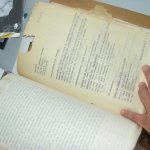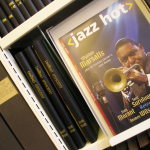Ekkehard Jost (Hg.): Darmstädter Jazzforum 89. Beiträge zur Jazzforschung
Hofheim 1990 (Wolke Verlag), in German, 237 pages, ISBN 3-923997-40-X, 19 €
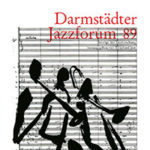 The first Darmstädter Jazzforum took place in desember 1989, where jazz researchers from Germany met to an informative symposion without any specific emphasis on a certain subject.
The book is in German and can be ordered directly from the the Jazzinstitut Darmstadt.
The first Darmstädter Jazzforum took place in desember 1989, where jazz researchers from Germany met to an informative symposion without any specific emphasis on a certain subject.
The book is in German and can be ordered directly from the the Jazzinstitut Darmstadt.
Essays:
- Bert Noglik: Improvisierte Musik in der Folge des Free Jazz
- Jürg Solothurnmann: Die aktuelle Situation des Jazz und der improvisierten Musik
- Hans Kumpf: Sowjetischer Jazz
- Klaus Scheuer: Zur Improvisationsweise Bix Beiderbeckes
- Wolfram Knauer: Die Entwicklung des Jazz zwischen Bebop und Free Jazz
- Ekkehard Jost: Cecil Taylor – Solo
- Günter Sommer: Die Jazzszene in der DDR
- Dieter Glawischnig: Eine Gemeinschaftsproduktion mit Ernst Jandl
- Bernd Konrad: Probleme der Jazzpädagogik
- Ludolf Kuchenbuch: “Notation” im Amateurjazz der 60er und 70er Jahre
- Wolfgang Schickhaus: Das Phänomen Swing
- Peter Niklas Wilson: Syntax und Ästhetik der Musik Ornette Colemans
- Herbert Hellhund: Einige Strukturprinzipien improvisierter Avantgardemusik
Wolfram Knauer (Hg.): Jazz und Komposition. Darmstädter Beiträge zur Jazzforschung, Bd. 2
Hofheim 1992 (Wolke Verlag), in German, 225 pages, ISBN 3-923997-41-8, 19 €
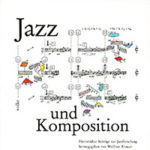 The second Darmstädter Jazzforum treated different concepts of composing in jazz music.
The book is in German and can be ordered through your local book dealer or directly from the publisher.
The second Darmstädter Jazzforum treated different concepts of composing in jazz music.
The book is in German and can be ordered through your local book dealer or directly from the publisher.
Essays:
- J. Bradford Robinson: “Jazz”-Rezeption in der Weimarer Periode
- Hans Ulrich Engelmann: Hans Ulrich Engelmann und der Jazz
- Lutz Neitzert: Über das problematische Verhältnis der bürgerlichen Musikkultur zu improvisierter Musik
- Gerhard Putschögl: John Coltrane. Strukturelle Organisation als orale Komposition
- Wolfram Knauer: Charles Mingus. Jazzkomposition nach Ellington
- Peter Niklas Wilson: Musikalische Systemphilosophie nach ihrem Ende. Anthony Braxtons musikalische Metaphysik
- Ekkehard Jost: Typen jazzmusikalischer Komposition
- Ran Blake: Third Stream – Vorrang des Ohrs
- Hermann Keller: Komplexe Vorgänge – einfache Grundlagen. Was vom kompositorischen Handwerk in meine Improvisationen eingeht
- Ulrich Kurth: Zur Rolle der Streichinstrumente. Kompositionen von Tony Oxley, Peter Herborn und Mark Dresser
- Bert Noglik: Komposition und Improvisation. Anmerkungen zu einem spannungsreichen Verhältnis
Wolfram Knauer (Hg.): Jazz in Europa. Darmstädter Beiträge zur Jazzforschung, Bd. 3
Hofheim 1994 (Wolke Verlag), in German, 261 pages, ISBN 3-923997-42-6, 19 €
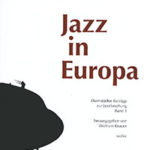 Das 3. Darmstädter Jazzforum versuchte eine Rundreise mit allgemeinen genauso wie mit ganz speziellen Beiträgen zum europäischen Jazz.
Das 3. Darmstädter Jazzforum versuchte eine Rundreise mit allgemeinen genauso wie mit ganz speziellen Beiträgen zum europäischen Jazz.
Essays:
- Marko Paysan: Transatlantic Rhythm. Jazzkontakte zwischen Deutschland und den USA vor 1945
- Erik Wiedemann: Jazz in Dänemark 1933 bis 1945
- Kees Wouters: Von den Wandervögeln zum Wanderers Hotclub
- Theo Mäusli: Jazz und Geistige Landesverteidigun. Zur Rezeption des Jazz in der Schweiz der Jahre 1933 bis 1945
- Walter Ojakäär: Jazz in Estland. Hoffnungen und Wirklichkeit
- Virgil Mihaiu: Entwicklung und Probleme des Jazz in Rumänien 1965 bis 1993
- Lubomir Doruzka: Jazz in der Tschechoslowakei 1945 bis 1993
- Bert Noglik: Osteuropäischer Jazz im Umbruch der Verhältnisse. Vom Wandel der Sinne im Prozeß gesellschaftlicher Veränderungen
- Misha Mengelberg: Misha Mengelberg spricht über seine Musik
- Wolfram Knauer: “Musicianer”, oder: Der Jazzmusiker als Musikant. Anmerkungen zum Verhältnis von Jazz und Folklore
- Jürg Solothurnmann: Die Alpine Jazz Herd. Zeitgenössischer Jazz und natonale Folklore, paßt das zusammen?
- Erik Kjellberg: “Old Folklore in Swedish Modern”. Zum Thema Volksmusik und Jazz in Schweden
- Ekkehard Jost: Über das Europäische im europäischen Jazz
Wolfram Knauer (Hg.): Jazz in Deutschland. Darmstädter Beiträge zur Jazzforschung, Bd. 4
Hofheim 1996 (Wolke Verlag), in German, 287 pages, ISBN 3-923997-70-1, 19 €
 The 4th Darmstädter Jazzforum discussed the history of jazz in Germany from the early 1930ies until the present.
The book is in German and can be ordered directly from the the Jazzinstitut Darmstadt.
The 4th Darmstädter Jazzforum discussed the history of jazz in Germany from the early 1930ies until the present.
The book is in German and can be ordered directly from the the Jazzinstitut Darmstadt.
Essays:
- Horst Bergmeier & Rainer Lotz: Charlie and his Orchestra. Ein obskures Kapitel der deutschen Jazzgeschichte
- Guido Fackler: Jazz im KZ. Ein Forschungsbericht
- Bernd Hoffmann: Die “Mitteilungen”. Anmerkungen zu einer “verbotenen Fanpostille”; Die “Mitteilungen (Reproduktion)
- Wolfram Knauer: Emanzipation wovon? Zum Verhältnis des amerikanischen und des deutschen Jazz in den 50er und 60er Jahren
- Musikergespräch mit Michael Naura: Es war ein lustiges Völkchen
- Komponistengespräch mit Klaus König: Reviews (A Revue for Frank Zappa)
- Bert Noglik: Hürdenlauf zum freien Spiel. Ein Rückblick auf den Jazz der DDR
- Ernst Ludwig Pettrowsky & Uschi Brüning: Gednaken eines Menschen aus Güstrow, der zwischen Nazi-Märschen, Stalin-Panzern und FDJ-Liedern der Faszination des Jazz erlag
- Ulrich Kurth: “Kurze Geschichten”. Die 90er Jahre
- Joachim Ernst Berendt: Wandel und Widerstand
Wolfram Knauer (Hg.): Jazz und Sprache, Sprache und Jazz. Darmstädter Beiträge zur Jazzforschung, Bd. 5
Hofheim 1998 (Wolke Verlagin German, 189 pages, ISBN 3-923997-79-5, 19 €
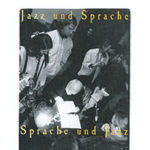 The 5th Darmstädter Jazzforum in October 1997 discussed the influence of jazz in literature and vice versa. It also reflected on the influence of language and critical writing on the general perception of jazz music.
The book is in German and can be ordered through your local book dealer or directly from the publisher.
The 5th Darmstädter Jazzforum in October 1997 discussed the influence of jazz in literature and vice versa. It also reflected on the influence of language and critical writing on the general perception of jazz music.
The book is in German and can be ordered through your local book dealer or directly from the publisher.
Essays:
- Wolfram Knauer: Jazz – Sprache – Lyrik – Kritik. Einige grundsätzliche Anmerkungen
- Stephan Richter: Magic Books and a Jam Session. Das Spannungsfeld von Literatur, Literaturtheorie und Jazz
- Heinz Steinert: “… und in dem allen ist der Gestus von Musik der Stimme entlehnt, die redet.” Über das komplexe Arbeitsbündnis des Genres “Jazz und Lyrik”
- Ernst Jandl & Dieter Glawischnig: ….. ‘texte und Jazz’ …..
- Mike Westbrook: The Westbrook Song Book
- Ekkehard Jost: Zum Sprachcharakter von Musik im allgemeinen und Jazz im speziellen
- Hans Ulrich Engelmann: Zur szenischen Kantate “Die Mauer”
- Wolfram Knauer: From Ellington to Malcolm X. Vom Umgang mit Texten/Libretti im Jazz
- George Gruntz: Jazz – Was für ein Theater?
- Christian Broecking: Viel Lärm um große Worte. Auch fiese Sätze können swingen. Wynton Marsalis und die Verbalisierung des Jazz in den 90er Jahren
Wolfram Knauer (Hg.): Duke Ellington und die Folgen. Darmstädter Beiträge zur Jazzforschung, Bd. 6
Hofheim 2000 (Wolke Verlag), in German, 276 pages, ISBN 3-923997-91-4, 19 €
 The 6th Darmstädter Jazzforum was dedicated to a single musician. On the occassion of Duke Ellingtons centenary, lectures and panels in September 1999 concentrated on the music of this overall pianist and composer.
The book is in German and can be ordered through your local book dealer or directly from the publisher.
The 6th Darmstädter Jazzforum was dedicated to a single musician. On the occassion of Duke Ellingtons centenary, lectures and panels in September 1999 concentrated on the music of this overall pianist and composer.
The book is in German and can be ordered through your local book dealer or directly from the publisher.
Essays:
- Wolfram Knauer: “Each Man Prays In His Own Language…” Duke Ellington und seine Welt
- Wolfram Knauer: “Reminiscing in Tempo”. Tradition und musikästhetische Ideale in Ellingtons kompositorischem OEuvre
- Bernd Hoffmann: “Zugunsten der deutschen Jugend”. Zur Rezeption afro-amerikanischer Musik in der Nachkriegszeit
- Peter Niklas Wilson: “Money Jungle”. Fäden eines Beziehungsnetzes
- Ekkehard Jost: “Open Letter to Duke”. Was Charles Mingus an Duke Ellington schrieb
- Franz Krieger: “Piano in the Foreground?”. Zum Klavierstil Duke Ellingtons
- Günter Lenz: “Die kulturelle Dynamik der afroamerikanischen Musik”. Duke Ellingtons Kulturbegriff und seine Bedeutung in der afro-amerikanischen Literatur
- Bill Dobbins: “Mood Indigo”. Die harmonische Sprache Duke Ellingtons
- Walter van de Leur: “Scores of Scores”. Einige Anmerkungen zu Manuscripten der Billy-Strayhorn- und Duke-Ellington-Sammlungen in den USA
Martin Pfleiderer: “Far East of the Blues”. Ellington und Weltmusik
Wolfram Knauer (Hg.): Jazz und Gesellschaft. Sozialgeschichtliche Aspekte des Jazz. Darmstädter Beiträge zur Jazzforschung, Bd. 7
Hofheim 2002 (Wolke Verlag), in German, 304 pages, ISBN 3-936000-01-8, 19 €
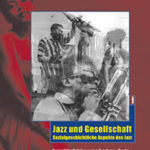 Two week after 9/11, in Septembver 2001, the 7th Darmstädter Jazzforum discussed the social impact and the sociological relevance of jazz in the US and abroad in the 20th century, and beyond.
The book is in German and can be ordered through your local book dealer or directly from the publisher.
Two week after 9/11, in Septembver 2001, the 7th Darmstädter Jazzforum discussed the social impact and the sociological relevance of jazz in the US and abroad in the 20th century, and beyond.
The book is in German and can be ordered through your local book dealer or directly from the publisher.
Essays:
- Ralf-Peter Fuchs: Neue Menschen und Kultur der Moderne. Der Jazz und sein Publikum in der deutschen Nachkriegspresse 1945 – 1953
- Christian Broecking: Adorno versus Berendt revisited. Was bleibt von der Kontroverse im Merkur 1953?
- Tobias Richtsteig: Jazz und Zahlen. www.jazzpublikum.de – Sozialpsychologische Basisdaten im Zeitvergleich. Ein Forschungsbericht
- Wolfram Knauer: “Wegweiser Jazz“. Anmerkungen zum Zustand der deutschen Jazzszene
- Heinz Steinert: Musik und Lebensweise. Warum und wie sich Jazz-Musik eignet, eine soziale Position zu markieren
- Wolfgang Sandner: Verbaler Impressionismus, wohlmeinende Apologie. Probleme der Jazzkritik
- Ursel Schlicht: Individuelle Musik auf Jazzbasis. Arbeitsbedingungen und Ausdrucksformen von Musikerinnen in Hamburg und New York
- Lewis A. Erenberg: Swing Left. Linke Politik und Bigband-Jazz in der Zeit des New-Deal
- Ingrid Monson: Über Jazz, Geschichte und soziale Theorie. Theoretische Hintergründe der “Freedom Sounds“
- George E. Lewis: “Gittin’ to know y’all“. Von improvisierter Musik, vom Treffen der Kulturen und von der “racial imagination“
- Mike Heffley: Vom Anarchischen zum Archaischen. Zur Theorie der freienImprovisation
- Peter Niklas Wilson: Von der sozialen Irrelevanz improvisierter Musik
- Ekkehard Jost: Reflexionen über die Soziologie des Jazz
Wolfram Knauer (Hg.): improvisieren… Darmstädter Beiträge zur Jazzforschung, Bd. 8
Hofheim 2004 (Wolke Verlag), in German, 248 pp, ISBN 3-936000-02-6, 19,- €
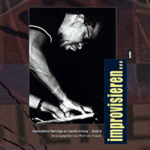 The 8th Darmstädter Jazzforum discussed different approaches of improvisation and why jazz without improvisation is no jazz.
The book is in German and can be ordered through your local book dealer or directly from the publisher.
The 8th Darmstädter Jazzforum discussed different approaches of improvisation and why jazz without improvisation is no jazz.
The book is in German and can be ordered through your local book dealer or directly from the publisher.
Essays:
- Wolfram Knauer: Noodlin’ and Doodlin’ and Playin’ Around…Zum sich wandelnden Selbstverständnis des Jazz als improvisierter Musik
- Lawrence Gushee: Improvisation im frühen Jazz
- Martin Pfleiderer: Improvisieren – ästhetische Mythen und psychologische Einsichten
- Thomas Mießgang: Die Kunst des Spontanen. Kann ein Bild improvisiert werden? Über Free Jazz, automatische Saxophone, Jack the Dripper, Materialaktionen und letzte Lockerungen
- Christopher Dell: Möglicherweise Improvisation
- George E. Lewis: “Voyager“ … Improvisieren mit dem Computer
- Ekkehard Jost: Notizen zur Improvisation
- Joachim Kühn und Bert Noglik im Gespräch: Improvisation und musikalische Realität
- Paul F. Steinhardt: between the lines. Die verwunderliche Verbindung von Geld und Musik
- Michael Rüsenberg: Improvisation als Modell wirtschaftlichen Handelns. Eine Erkundung
- Peter Niklas Wilson: Neue Paradigmen in der improvisierten Musik
Wolfram Knauer (Hg.): Jazz goes Pop goes Jazz. Der Jazz und sein gespaltenes Verhältnis zur Popularmusik. Darmstädter Beiträge zur Jazzforschung, Bd. 9
Hofheim 2006 (Wolke Verlag), in German, 284 pp, ISBN 3-936000-03-4; 22 €
 The 9th Darmstädter Jazzforum focussed on the different aspects of the tense relationship between pop and jazz music. It tried to clarify such basic questions like "What makes music popular?", "When did pop music and jazz seperate?". Participants of the conference also explained economic aspects, musical trends and esthetic conflicts.
The book is in German and can be ordered through your local book dealer or directly from the publisher.
The 9th Darmstädter Jazzforum focussed on the different aspects of the tense relationship between pop and jazz music. It tried to clarify such basic questions like "What makes music popular?", "When did pop music and jazz seperate?". Participants of the conference also explained economic aspects, musical trends and esthetic conflicts.
The book is in German and can be ordered through your local book dealer or directly from the publisher.
Essays:
- Martin Pfleiderer: Was macht Musik populär? Überlegungen zur (Un-)Popularität im Jazz und anderswo
- Andrew Hurley: Joachim Ernst Berendt – Jazz, U-Musik, Pop-Jazz und die Ambivalenz (1950-1970)
- Fabian Holt: Not a Silent Way. Populäre Musik und Jazzmodernismus nach Elvis
- Wolfram Knauer: Healing Force of the Universe? Warum der Free Jazz zahm wurde
- Jürgen Schwab: New Standards – Die (gar nicht mal so) neue Lust am Covern im Jazz
- Frithjof Strauß: Zwischen Mystizismus und Funktionalismus. Zur Popularität des Jazz aus Skandinavien
- Doris Schröder: Bunte Musik. Die Jazzbilder Tony Munzlingers zwischen Karikatur, Popart und Gebrauchskunst
- Roundtable zu Aspekten der Produktion und Vermarktung von Jazz mit Veit Bremme, Bodo Jacoby, Harald Justin, Reiner Michalke und Olaf Schönborn
- Peter Kemper: Wer wär nicht gern ein Global Player? – Über die orthodoxe und paradoxe Annäherung von Jazz und Pop
- Colin Towns: Musik für Herz, Kopf und Füße. Die unterschiedlichen musikalischen Seiten des Colin Towns
- Wolfram Knauer: Die Wissenschaft vom Rhythmus. DJ Spooky, der Philosoph der Plattenleger, erklärt die DJ-Kunst
- Andreas Felber: Alter Greis auf der Suche nach neuer Jugend? Anmerkungen zur neuen Offenheit zwischen Jazz und populärer Musik in den 90er- und 00er-Jahren
- Diedrich Diederichsen: Jazz als Concept-Art
Wolfram Knauer (Hg.): Begegnungen. The World Meets Jazz. Darmstädter Beiträge zur Jazzforschung, Bd. 10
Hofheim 2008 (Wolke Verlag), in German, 320 pp, ISBN 3-936000-04-7; 24 €
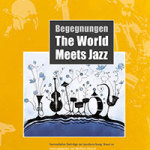 The volume contains the lectures of the 10th Darmstädter Jazzforum. The concference discussed the affinity of so called ethnic "world music" and jazz music over the decades and the musical and creative exchange that accompanied jazz music constantly.
The volume contains the lectures of the 10th Darmstädter Jazzforum. The concference discussed the affinity of so called ethnic "world music" and jazz music over the decades and the musical and creative exchange that accompanied jazz music constantly.
The book is in German and can be ordered through your local book dealer or directly from the publisher.
Essays:
- Andrew W. Hurley: But Did the World Meet Jazz? Ein Blick hinter Joachim Ernst Berendts Plattenreihe”Jazz Meets the World”
- Martin Pfleiderer: The World Meets Jazz. Zur Ästhetik des Jazz im Zeitalter der Globalisierung
- Maximilian Hendler: Jazz oder nicht Jazz? Rollenpolyphonie und ihr Vorkommen auch außerhalb des Jazz
- Torsten Eßer: Jazz in Lateinamerika – Eine periphere Erscheinung?
- Wolfram Knauer: Blowin’ Up a (European) Storm. Eine Annäherung an die Personalstile von Harry Beckett, Tomasz Stanko und Enrico Rava
- Gerhard Putschögl: Flamenco Jazz
- Timothy R. Mangin: Cosmopolitan Roots. Jazz im Senegal
- Gerhard Kubik: Referentielle Elementarpulsationen. Bemerkungen zur konzeptuellen Welt unseres Jazz aus dem südlichen Afrika
- Günther Huesmann: John Zorn und der japanische Traditionsbegriff
- Ralf Dombrowski: Das Originale und das Originelle. Techniken kultureller Aneignung am Beispiel des Oriental Jazz
- Gilad Atzmon: Jazz und Jihad. Ein (Bird-)Fundamentalist erklärt seine Sicht des Jazz
- Karl Berger: Skizzen weltmusikalischer Erfahrungen
- Harald Justin: Jazz und World Music im Fadenkreuz des Kulturkampfes
Wolfram Knauer (Hg.): Albert Mangelsdorff. Tension | Spannung. Darmstädter Beiträge zur Jazzforschung, Bd. 11
Hofheim 2010 (Wolke Verlag), in German, 320 pages, ISBN 078-3-936000-05-4; 27,- €
 This volume contains lectures of the 11th Darmstädter Jazzforums in October 2009. It examines different facetts in the work of the famous German trombonist, looks at his musical and esthetic influence on other trombonists of his age, as well as on latest developments in German jazz. It alway follows the "leitmotiv" which Albert Mangelsdorff encorporated most, musical open-mindness.
This volume contains lectures of the 11th Darmstädter Jazzforums in October 2009. It examines different facetts in the work of the famous German trombonist, looks at his musical and esthetic influence on other trombonists of his age, as well as on latest developments in German jazz. It alway follows the "leitmotiv" which Albert Mangelsdorff encorporated most, musical open-mindness.
The book is in German and can be ordered through your local book dealer or directly from the publisher.
Essays:
- Wolfgang Sandner: Ein Prototyp und Sonderfall: Albert Mangelsdorff, Jazzmusiker in Deutschland
- Rüdiger Ritter: Jazz-Musiker als „Gründungsväter“ für nationale Jazzszenen? Krzysztof Komeda und der polnische Jazz
- René Grohnert: Bilder zur Musik. Jazzplakate (von Günther Kieser und Niklaus Troxler) zwischen Ankündigung und Erinnerung
- Wolfram Knauer: Es sungen drei Engel. Zum Umgang von Jazzmusikern mit deutscher Musiktradition
- Martin Pfleiderer: Singin’ the Blues. Vokale Expressivität im instrumentalen Jazz
- Kai Stefan Lothwesen: Emanzipation, Jazz-Dissidenten und Paradigmenwechsel. Anmerkungen zur Diversität des europäischen Jazz
- Harald Kisiedu: „European Freedom“. Zum Verhältnis von Musik und Politik bei Peter Brötzmann
- William Bares: Play Your Own Thing „Our“ Thing: „Young German Jazz“ und die deutsche Jazzidentität
- Silvana K. Figueroa-Dreher: Was kann die Soziologie vom Free Jazz lernen?
- Harald Justin: Jenseits des Skandals. Albert Mangelsdorff: Autobiographisches Erzählen im Kontext (und mögliche Paradigmenwechsel im deutschen Jazz)
- Michael Rieth: Goethe und der Blues, Kropotkin und die Krone, Albert und die Anarchie
- Jürgen Schwab: „50 Jahre institutionalisierte Subkultur“. Das hr-Jazzensemble, eine Bestandsaufnahme
- Michael Rüsenberg: „Ein musikalisches Zwiegespräch zwischen dem weltberühmten Posaunisten und dem unbekannten Wal“. Anmerkungen zu Albert Mangelsdorff
Wolfram Knauer (Hg.): JAZZ.SCHULE.MEDIEN. Darmstädter Beiträge zur Jazzforschung, Band 12
Hofheim 2012 (Wolke Verlag), in German, 256 pp, ISBN: 978-3-936000-92-4; 24,- €
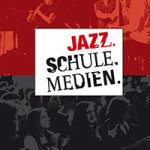 This volume contains essays of the lectures held during the 12th Darmstädter Jazzforum in September 2011, which was dedicated to a wider theoretical debate about knowledge-sharing and teaching jazz at school and in the media. The publication intends to involve readers in a discussion how jazz reaches a wider public recognition in the future without deforming its character as an unique artform or even loose its creative freedom.
This volume contains essays of the lectures held during the 12th Darmstädter Jazzforum in September 2011, which was dedicated to a wider theoretical debate about knowledge-sharing and teaching jazz at school and in the media. The publication intends to involve readers in a discussion how jazz reaches a wider public recognition in the future without deforming its character as an unique artform or even loose its creative freedom.
The book is in German and can be ordered through your local book dealer or directly from the publisher.
Essays:
- Walter Turkenburg: Jazzpädagogik in Europa . Straße und Schule
- Joe Viera: Jazzpädagogik. Zur Geschichte in Deutschland nach 1945. Aufgaben – Methoden – Zukunft
- Siegried Busch: Jazz für Lehrer
- Bert Gerhardt: Jazz in der Schule – nur was für die Elite?
- Jürgen Terhag: Jazz als Basis der musikpädagogischen Arbeit mit Populärer Musik. Wege aus dem Ghetto
- Günter B. Schmidt und Cordula Groß: Black Music als Teil der Schulsozialarbeit
- Daphne Lipp und Sascha Wild: Jazz und improvisierte Musik in der Schule.! Eine Förderausschreibung der Stiftung Polytechnische Gesellschaft Frankfurt am Main
- Olaf Stötzler und Jochen Stolla: Vermittlung durch Begegnung. Jugendprojekte der hr-Bigband. Bedingungen und Chancen musikalischer Bildung durch eine Rundfunk-Bigband
- Wolfram Knauer: jazzwissen.de. Online-Modul als Hilfe zur Vermittlung von Jazz im Schulunterricht
- Michael Rüsenberg: “Amylgada: das Jazz-Zentrum im Gehirn”. Eine Exkursion zu den Neurowissenschaften
- Elena Ungeheuer: Herausforderungen der Musikvermittlung heute
- Bernd Hoffmann: Spieglein, Spieglein an der Wand. Präsentationen des Jazz in deutschsprachigen Medien
- Hans-Jürgen Linke: Alltagsraunen. Über inhaltliche FRagen, Jazz in der Tagespresse, Feulleton-Betrieb und andere langsam veraltende Probleme
- Reinhard Köchl: Jazzjournalismus heute: Ohne Anzeige keine Zeile?
- Nils Wülker: Über dem Publikum muss die Sonne aufgehen
- Roundtable Jazzjournalismus: Reporter, Kritiker, Vermittler
- Arndt Weidler: PSSST! … und wenn das Jazzpublikum schuld daran ist, dass so wenig Publikum zu Jazzkonzerten kommt?!
- Roundtable Musiker: Das Publikum: Amorphe Masse oder Energiespender?
Wolfram Knauer (ed./Hg.): Jazz Debates / Jazzdebatten, Darmstädter Beiträge zur Jazzforschung Bd. 13
Wolke Verlag (Hofheim), 2014, English and German, 224 pp., Photos, Paperback, € 24,-, ISBN: 978-3-95593-013-4
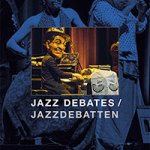
Debates in jazz history are aesthetic marks which reflect discourses about the directions the music might take. In September 2013 experts from Europe and the USA met at the Darmstadt Jazzforum to discuss how such debates inform the perception of jazz to this day. The essays in this book focus on the effects of jazz debates on the aesthetic opinion. They examine historical as well as current debates within the German jazz scene. They discuss the gender debate in jazz, asking how an ideal of masculinity influences both the music and its reception as well as where in the jazz discourses one might find room for women and the LGBT community. Finally, they focus on the latest debate about the term "jazz" itself, touching questions about both historical and aesthetic ownership of music.
Essays:
- Jürgen Arndt: Schlager, Jazz und Argumente: 1953 und 60 Jahre danach oder: Als der Jazz seine Stimme verlor
- Siegfried Schmidt-Joos: Jazzpapst Revisited. Rückblick auf einen Konflikt
- Martin Pfleiderer / Wolf-Georg Zaddach: Der gegenwärtige Jazzdiskurs in Deutschland. Versuch einer empirischen Rekonstruktion anhand von Jazzzeitschriften
- John Gennari: Remapping the Boundaries of Jazz: The Case of Jason Moran
- Peter Elsdon: The Potential of the Jazz Record
- Nichole Rustin-Paschal: Self Portrait: On Emotion and Experience As Useful Categories of Gender Analysis in Jazz History
- John Gill: Miles in the Sky: Dismantling the glass closet in jazz
- Tony Whyton: Crosscurrents: the cultural dynamics of jazz
- Christian Broecking: Not Black enough? Debating jazz in the post-blackness time space
- Wolfram Knauer “Jazz” or not “Jazz”. From Word to Non-Word and Back
Wolfram Knauer (ed./Hg.): Gender and Identity in Jazz, Darmstädter Beiträge zur Jazzforschung Bd. 14
Wolke Verlag (Hofheim), 2016, English and German, 308 pp., Photos, Paperback, € 28,-, ISBN: 978-3-95593-014-1

The 14th Darmstadt Jazzforum held in October 2015 focused on different aspects of identity in jazz. The participants talked about the perception of female instrumentalists, about "male" or "female" sound, about homosexuality, about references to the body as well as about the denial of the erotic element in music, about Jutta Hipp, Ivy Benson, Clare Fischer, Sun Ra and others. The conference participants looked at jazz history, but they self-confidently also looked at the jazz scene of today. They discussed how common prejudices can be overcome and how to describe the gender discourse of the 21st century. It is perfectly clear that the view of jazz musicians and their art may be distorted if we reduce them to any parts of their identity, be it their gender, their sexual orientation, their ethnicity, or anything else. However, to ignore these facets, be it in jazz history or today"s jazz scene, is a proof of neglect as well. With this publication we hope to contribute to a discourse which is and remains important in our changing modern world.
Essays:
- Wolfram Knauer: Clash of Identities
- Mario Dunkel: Sexuality, Eroticism, and the Construction of the Jazz Tradition
- Katherine Williams: “Alright for a Girl”, and Other Jazz Myths
- Michael Kahr: Chromaticism and Identity in the Music of Clare Fischer
- Yoko Suzuki: Gendering Musical Sound in Jazz Saxophone Performance
- Ilona Haberkamp: Hipp Style or Adaption?
- Martin Niederauer: Male Hegemony in Jazz – Trying to Understand One Important Element of Jazz’s Gender Relations
- Joy Ellis and Adam Osmianski: Women and the Jazz Jam
- Christopher Dennison: One-Armed Ball Players: The Language of Homophobia in Jazz
- Jenna Bailey: “Play Like a Man and Look Like a Woman”, Exploring the Role of Gender in Ivy Benson’s All Girl Band
- Ilka Siedenburg: Bigbandklassen: Ein Weg zur musikalischen Praxis jenseits von Geschlechterstereotypen?
- Mane Stelzer: „Für uns war es fremde Musik“, Wie junge Instrumentalistinnen zum Jazz finden (oder auch nicht)
- Nicole Johänntgen: SOFIA und mehr, Eine persönliche Annäherung an ein Frauen-Musikprojekt
- Sherrie Tucker: A Conundrum is a Woman-in-Jazz: Enduring Improvisations on the Categorical Exclusions of Being Included
- John Murph: Exploring Queer Notions Inside Sun Ra’s Outer Space Ways
- Christian Broecking: “Authentic Lesbian As I Am”, Aspects of Gender, Marginalization and Political Protest in the Life and Work of Irène Schweizer
- Nicolas Pillai: Watching Men Play. The Erotics of the Hollywood Jazz Film
Wolfram Knauer (ed./Hg.): Jazz@100. An alternative to a story of heroes. Darmstädter Beiträge zur Jazzforschung Bd. 15
Wolke Verlag (Hofheim), 2018, English, 296 pp., Photos, Paperback, € 28,-, ISBN: 978-3-95593-015-8

In the centenary of jazz ¬the Darmstadt Jazzforum conference in 2017 looked at the pitfalls of jazz historiography, which often relies on myths and legends that distort what is even more important: the multi-perspectivity of a music which is being created not only by great masters, but certainly by many individualists. The fifteen essays in this book try to shift our perspectives on people, places and styles. They focus on what we think we know about jazz in order to question the same knowledge and make us aware both of the ways in which our understanding of the music, its history and its aesthetic has been shaped, and of how that understanding continues to change to this day.
Essays:
- Arne Reimer: My Encounters with American Jazz Heroes
- Nicholas Gebhardt: Reality Remade. Narrative and the historical imagination in Alan Lomax’s Mister Jelly Roll
- Katherine M. Leo: The ODJB at 100. Revisiting Essential Narratives and Copyright Control of Victor 18255
- Klaus Frieler: A Feature History of Jazz Improvisation
- Andrew Wright Hurley: In and Out: Processes of Inclusion and Exclusion in Joachim Ernst Berendt’s Jazzbuch, or Towards the Biography of a Book
- Tony Whyton: A Familial Story: Hidden Musicians and Cosmopolitan Connections in Jazz History
- Mario Dunkel: Darcy James Argue’s Uchronic Jazz
- A talk with pianist and composer Orrin Evans: “Just be me!”
- Krin Gabbard: Syncopated Women. Gender and Jazz History in 1942 Hollywood
- Wolfram Knauer: Four Sides of a House. How Jazz Spaces Irritate, Fascinate, Stimulate Creativity or Become Icons
- Oleg Pronitschew: Die Institutionalisierung des Jazz. Wie die westdeutsche Jazzdebatte der 1970er Jahre das Selbstverständnis einer Szene veränderte
- Rüdiger Ritter: Myths in Jazz – Artistic Prison or Productive Element? The Shaping of “Polish Jazz”
- Karen A. Chandler: Bin Yah (Been Here). Africanisms and Jazz Influences in Gullah Culture
- Scott DeVeaux: Was Bebop a Mistake?
- Nicolas Pillai: A Star Named Miles. Tracking Jazz Musicians Across Media
Wolfram Knauer (ed./Hg.): Positionen! Jazz und Politik. Darmstädter Beiträge zur Jazzforschung Bd. 16
Wolke Verlag (Hofheim), 2020, Deutsch, 248 pp., Photos, Paperback, € 24,-, ISBN: 978-3-95593-016-5

"POSITIONEN! Jazz und Politik" is documenting the last Darmstadt Jazzforum conference, where we asked about current political involvement of the jazz world at home, in our country and society, in Germany, and we heard from scholars, journalists and musicians alike. The book looks at previous political discourses within German jazz, discusses the political impact of exemplary bands like Jan Klare's The Dorf. It also asks about the differences between contemporary improvised and composed music in respect to their political messages. Musicians discuss how they incorporate their political thoughts in their art as well as arguments for a political consciousness on the German jazz scene and the intermedial connection between music and societal perception. Others explain their own political motivations for the decision to become a jazz musician or discuss jazz as a social role model. The book does also look at the perspectives of musician, promoter, journalist and audience when it comes to political meanings in music. Musicologists analyse right-wing populist movements in Germany and Austria and ask about their use of Afrodiasporic music and argue about musical interaction as a democratic act. Influential German festival promoters talk about what political responsibility festivals have when presenting jazz. In a major discussion contributers questions whether jazz is political in essence, while the president of German Bundeszentrale für politische Bildung, Thomas Krüger, describes the potential of jazz for political education.
The book is in German and can be ordered through your local book dealer or directly from the publisher (Wolke Verlag).
Essays:
- Stephan Braese: Stammheim war nie Attica. Zur politischen Widerständigkeit des Jazz in Deutschland seit 1945
- Henning Vetter: Politischer Jazz oder Deutungshoheit: Wem gehört das Gehörte? Eine Untersuchung am Beispiel des Musikerkollektives The Dorf
- Nina Polaschegg: Sind frei Improvisierende die besseren Demokraten?
- Benjamin Weidekamp + Michael Haves: Alles wird gut gegangen sein – Der Talk
- Wolfram Knauer: Jazz und Politik – politischer Jazz?Eine bundesdeutsche Perspektive
- Mario Dunkel: Zusammenhänge zwischen Populismus, Jazz und afrodiasporischen Musiken als Ausgangspunkt für Demokratiebildung
- Martin Pfleiderer: „… an outstanding artistic model of democratic cooperation“? Zur Interaktion im Jazz
- Nadin Deventer, Tina Heine, Lena Jeckel, Ulrich Stock: Veranstalter:innen: die Influencer des Jazz?
- Nikolaus Neuser (Trompete) und Florian Juncker (Posaune): „Occupied Reading“. Musikalische Intervention
- Hans Lüdemann: Gesellschaftliche und politische Positionierung eines deutschen Jazzmusikers heute
- Nikolaus Neuser: Improvisation als Handlungskonzept
- Michael Rüsenberg: „Jazz ist stets politisch“. Stimmt diese Aussage von Mark Turner? Und, hört man sie in seiner Musik?
- Thomas Krüger:Politische Dimensionen des Jazz im Kontext von Emanzipation und Kulturalisierung
- Korhan Erel, Tim Isfort, Angelika Niescier, Victoriah Szirmai: … im Ohr des Betrachters …Ein Panel über das Politische in der Musik
- Atef Ben Bouzid / Ulrich Stock: „Cairo Jazzman – The Groove of a Megacity“
Wolfram Knauer (Hg.): ROOTS | HEIMAT. Diversity in Jazz. Darmstädter Beiträge zur Jazzforschung Bd. 17
Wolke Verlag (Hofheim), 2022, German, 303 pp., Photos, Paperback, € 29,-, ISBN: 978-3-95593-017-2
 Jazz is a symbol of diversity - at least that's what you might think when you look at the history of African-American music. But do we, especially in Europe, pay enough respect to this idea? Isn't our veneration of the great jazz heroes mere lip service when, in this music that is after all about freedom and individuality, we have to realize at the same time that women are still rare in this country, not to mention BIPoC (Black, Indigenous, People of Color)? Hasn't jazz in Germany long since become an established high culture, made and heard only by an academic minority? And if so, how satisfied are we with the status quo, or how can we change it? Questions to which this book seeks answers in very different approaches.
Jazz is a symbol of diversity - at least that's what you might think when you look at the history of African-American music. But do we, especially in Europe, pay enough respect to this idea? Isn't our veneration of the great jazz heroes mere lip service when, in this music that is after all about freedom and individuality, we have to realize at the same time that women are still rare in this country, not to mention BIPoC (Black, Indigenous, People of Color)? Hasn't jazz in Germany long since become an established high culture, made and heard only by an academic minority? And if so, how satisfied are we with the status quo, or how can we change it? Questions to which this book seeks answers in very different approaches.
Essays:
- Wolfram Knauer: Vorwort – Wie offen ist der Jazz?
- Philipp Teriete: The Classical Training of Early African American Jazz Musicians. Der musikalische Ausbildungskanon an den Historically Black Colleges and Universities im späten 19. und frühen 20. Jahrhundert und der Einfluss auf den frühen Jazz
- Vincent Bababoutilabo: Black Music Matters. Beobachtungen eines Antirassisten in der deutschen Jazzausbildung
- Roundtable 1 mit Simin Tander, Reza Askari, Gabriele Maurer: Vom Fremdsein, Ankommen, Fremdbleiben. Gespräch über eigene Erfahrung der Identitätswahrnehmung.
- Philipp Schmickl: Re-inventing the World at Home. How Globally Circulating Forms Fuel the Imagination of Local Festival Organizers
- Ádám Havas: Zur Dekonstruktion hegemonialer Jazz-Narrative. Die Rolle von Roma-Musikern bei der Artikulation einer osteuropäischen Differenz
- Gestaltung ist eine Haltung. Niklaus Troxler im Gespräch mit Wolfram Knauer
- Harald Kisiedu: „We Are Bessie Smith’s Grandchildren“. Reflections on Creolization in post-1950s Experimental Jazz in Europe
- Timo Vollbrecht: Das Problem des Othering. Exotismus im Jazz, Artistic Othering und Komplexe Intersektionalität
- Stephan Meinberg: Vom Umgang mit dem Privilegiert-Sein
- Roundtable 2 mit Jean-Paul Bourelly, Kornelia Vossebein, Frieder Blume und Joana Tischkau: An die Arbeit: Realität verändern!!! Get to work! Let’s change reality!!!
- Nico Thom: „Der Mann mit der schwarzen Stimme“. Europäischer Amerikanismus am Beispiel von Bill Ramsey
- Anna-Lise Malmros: Black Dada / Ascension Unending. From Baraka to Coltrane, from Hell to Heaven. John Tchicai in the 1960s in New York and Copenhagen: Breaking the Hidden and Open Rules of Jazz
- Peter Kemper: „Ich hatte halt den Blues nicht mit der Muttermilch eingesogen.“ Heinz Sauer & Archie Shepp: Differenzen eines musikalischen Dialogs
- Wir wie die Welt sehen (wollen) Jo Wespel & Sanni Lötzsch: FESTIVAL BOOST NOW! Selbstermächtigung der Musiker:innen, Communities und zugängliche Strukturen
- Luise Volkmann: Ritualität im Jazz. Das Musikritual als Synthese von Herkunft, Heimat und dem futuristischen Jetzt
- Luise Volkmann & Ella O’Brien-Coker: Ritualität, unsere vielen Identitäten und das performative Sprechen
- Roundtable 3 mit Constanze Schliebs, Therese Hueber und Sylvia Freydank: Exportieren wir eigentlich nur Musik oder auch unsere Weltsicht?
Wolfram Knauer (Hg.): destination unknown. Die Zukunft des Jazz. Darmstädter Beiträge zur Jazzforschung Bd. 18
Wolke Verlag (Hofheim), 2024, German, 272 pp., Photos, Paperback, € 29,-, ISBN: 978-3-95593-018-9

How will jazz sound in the future? Who do we address, and who do we reach? How important are spaces, physically as well as in a metphoric sense? Spaces to enable and to secure musical creativity. How did musicians in the past anticipated the future outcome of their specific artform and what can be deducted for todays situation? Does it make sense to speak of a "Future of Jazz" in a post-genre era, which leads us to the crucial question "What is jazz these days?".
This book contains some answers, but first of all it evoves further questions, which illustrate that "jazz", "improvised music", "Black American Music", or however we may name it, does have a future, just because it seizes contemporary discouses, and - by the way - reveals new perpectives for us all.
Essays:
- Wolfram Knauer: Vorwort – Destination Unknown. Die Zukunft des Jazz
- André Doehring: Glotzmusik und Blubberbumm: Wolfgang Dauners vergangene Zukunft des Jazz ins Heute gewendet
- Harald Kisiedu: “JAZZ IS DEAD”: Überlegungen zu einer gar nicht mal so neuen Idee
- Panel 1 Jazz – aber für wen eigentlich? mit James Banner, Evi Filippou und Julia Kadel
- Richard Herzog: Ancient to the Future – Jazz ersteht aus seiner Vergangenheit auf, bei Matana Roberts und Moor Mother
- Magdalena Fürnkranz: Jazz and Afrofuturism. When Sun Ra met Janelle Monáe
- Bettina Bohle: Genre & Jazz – Eine sprachpragmatische Annäherung an eine hitzige Diskussion
- Niels Klein + Jorik Bergman: Zukunftsmusik. Ein Gespräch
- Marie Härtling: The All of Everything
- Frank Gratkowski: Was ist Jazz? Was könnte Jazz sein? Was könnte aus ihm werden? Ein paar persönliche Anmerkungen
- Panel 2 Macht Platz! mit Esther Weickel, Jonas Pirzer und Camille Buscot
- Teresa Becker: Zur Rolle und Funktion von Musiker:innen in der Nachhaltigkeitskommunikation
- Monika Herzig: New Standards: 101 Action Items. Ein praktischer Leitfaden zur Genderparität
- Kaspar von Grünigen: Möglichkeiten und Grenzen der Demokratisierung von Kulturpolitik: Die Basler „Initiative für mehr Musikvielfalt“
- Thomas Meinecke im Gespräch mit Peter Kemper
- Uli Kempendorff: Exit from the Nineties
- Panel 3 Es geht ums Ganze! mit Mariana Bondarenko, Akiko Arendt und Jan Klare
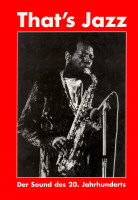 The Darmstadt exhibition catalog is a standard work on jazz history. Authors from many countries deal with jazz history from different perspectives. The history of American jazz is juxtaposed with that of European jazz, but topics such as jazz and literature, jazz and film, jazz and the visual arts, and others are also knowledgeably treated. is still praised worldwide as a prime example of a comprehensive jazz book and, with hundreds of photos, texts written by experts, and its appealing layout, is a standard work as well as the best birthday gift for any jazz lover. "That's Jazz. The Sound of the 20th Century is only available through bookstores, although all editions are now out of print. Nevertheless, it can be worthwhile to ask for it in second-hand bookshops - internet antiquaries are also very helpful here.
The Darmstadt exhibition catalog is a standard work on jazz history. Authors from many countries deal with jazz history from different perspectives. The history of American jazz is juxtaposed with that of European jazz, but topics such as jazz and literature, jazz and film, jazz and the visual arts, and others are also knowledgeably treated. is still praised worldwide as a prime example of a comprehensive jazz book and, with hundreds of photos, texts written by experts, and its appealing layout, is a standard work as well as the best birthday gift for any jazz lover. "That's Jazz. The Sound of the 20th Century is only available through bookstores, although all editions are now out of print. Nevertheless, it can be worthwhile to ask for it in second-hand bookshops - internet antiquaries are also very helpful here. "Frankfurt Sound" - this catchphrase, coined by Polish musicians in 1957, tried to sum up the specific cool jazz of the circle around Joki Freund and the Mangelsdorff brothers. At that time, numerous impulses for the national and international jazz scene emanated from Frankfurt am Main. Many a musical beacon was lit by Albert Mangelsdorff, but others also made their mark: Horst Lippmann and Fritz Rau as concert promoters, for example, or the German Jazz Federation as a lobby for jazz. Using the example of the Hesse metropolis, the "jazz capital of the republic" in the first post-war decades, this book tells the story of jazz in Germany: from the earliest astonished reflections in the face of black artists from overseas, through the dance enthusiasm of the 1920s, the criminalization during the Nazi era, the enthusiastic reconstruction work of the 1950s, to the self-evidence of jazz as an expression of contemporary art.
"Frankfurt Sound" - this catchphrase, coined by Polish musicians in 1957, tried to sum up the specific cool jazz of the circle around Joki Freund and the Mangelsdorff brothers. At that time, numerous impulses for the national and international jazz scene emanated from Frankfurt am Main. Many a musical beacon was lit by Albert Mangelsdorff, but others also made their mark: Horst Lippmann and Fritz Rau as concert promoters, for example, or the German Jazz Federation as a lobby for jazz. Using the example of the Hesse metropolis, the "jazz capital of the republic" in the first post-war decades, this book tells the story of jazz in Germany: from the earliest astonished reflections in the face of black artists from overseas, through the dance enthusiasm of the 1920s, the criminalization during the Nazi era, the enthusiastic reconstruction work of the 1950s, to the self-evidence of jazz as an expression of contemporary art.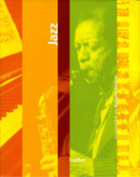 Jazz is often called the America's major contribution to the musics of the 20th century. Some crucial characteristics distinguishes it from other musical artforms. The music is even older than its name, and had never been meant to be an artform, although it had been perceived as a source of artistic inspiration. Jazz was passed on orally, and lives, until today, from its vibrant perfomance tradition. The historic legacy of jazz is rather to find in discographiies than in libraries or music archives. It is possible that the eroticizing light music that was played in American city dives at the beginning of the 20th century is far more distant from the musical concepts of Anthony Braxton seventy years later than the music of the Florentine Camerata is from the light cycle of Karlheinz Stockhausen.
Jazz is often called the America's major contribution to the musics of the 20th century. Some crucial characteristics distinguishes it from other musical artforms. The music is even older than its name, and had never been meant to be an artform, although it had been perceived as a source of artistic inspiration. Jazz was passed on orally, and lives, until today, from its vibrant perfomance tradition. The historic legacy of jazz is rather to find in discographiies than in libraries or music archives. It is possible that the eroticizing light music that was played in American city dives at the beginning of the 20th century is far more distant from the musical concepts of Anthony Braxton seventy years later than the music of the Florentine Camerata is from the light cycle of Karlheinz Stockhausen. Full of history, but still modern out of time ... this could be the best way to characterize the pictures of the Gemen photographer Karlheinz Fürst. Far beyond digital processing, Karlheinz Fürst kept a photographers eye on an crucial chapter in German jazz history in the years 1958 to 1963, often commissioned by Joachim Ernst Berendt.
Full of history, but still modern out of time ... this could be the best way to characterize the pictures of the Gemen photographer Karlheinz Fürst. Far beyond digital processing, Karlheinz Fürst kept a photographers eye on an crucial chapter in German jazz history in the years 1958 to 1963, often commissioned by Joachim Ernst Berendt.















 Jazz is a symbol of diversity - at least that's what you might think when you look at the history of African-American music. But do we, especially in Europe, pay enough respect to this idea? Isn't our veneration of the great jazz heroes mere lip service when, in this music that is after all about freedom and individuality, we have to realize at the same time that women are still rare in this country, not to mention BIPoC (Black, Indigenous, People of Color)? Hasn't jazz in Germany long since become an established high culture, made and heard only by an academic minority? And if so, how satisfied are we with the status quo, or how can we change it? Questions to which this book seeks answers in very different approaches.
Jazz is a symbol of diversity - at least that's what you might think when you look at the history of African-American music. But do we, especially in Europe, pay enough respect to this idea? Isn't our veneration of the great jazz heroes mere lip service when, in this music that is after all about freedom and individuality, we have to realize at the same time that women are still rare in this country, not to mention BIPoC (Black, Indigenous, People of Color)? Hasn't jazz in Germany long since become an established high culture, made and heard only by an academic minority? And if so, how satisfied are we with the status quo, or how can we change it? Questions to which this book seeks answers in very different approaches. How will jazz sound in the future? Who do we address, and who do we reach? How important are spaces, physically as well as in a metphoric sense? Spaces to enable and to secure musical creativity. How did musicians in the past anticipated the future outcome of their specific artform and what can be deducted for todays situation? Does it make sense to speak of a "Future of Jazz" in a post-genre era, which leads us to the crucial question "What is jazz these days?".
This book contains some answers, but first of all it evoves further questions, which illustrate that "jazz", "improvised music", "Black American Music", or however we may name it, does have a future, just because it seizes contemporary discouses, and - by the way - reveals new perpectives for us all.
How will jazz sound in the future? Who do we address, and who do we reach? How important are spaces, physically as well as in a metphoric sense? Spaces to enable and to secure musical creativity. How did musicians in the past anticipated the future outcome of their specific artform and what can be deducted for todays situation? Does it make sense to speak of a "Future of Jazz" in a post-genre era, which leads us to the crucial question "What is jazz these days?".
This book contains some answers, but first of all it evoves further questions, which illustrate that "jazz", "improvised music", "Black American Music", or however we may name it, does have a future, just because it seizes contemporary discouses, and - by the way - reveals new perpectives for us all.
